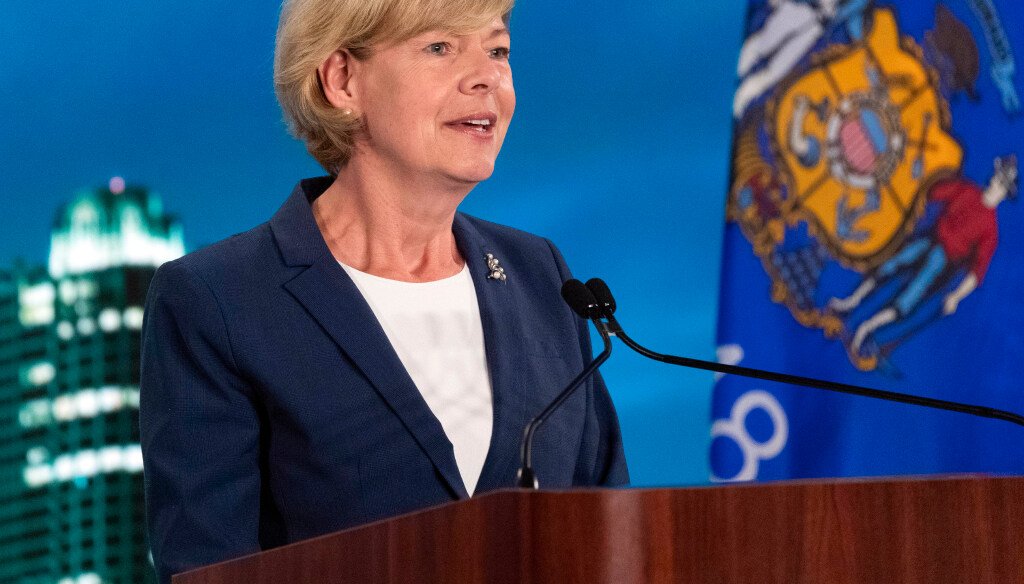

Our only agenda is to publish the truth so you can be an informed participant in democracy.
We need your help.


An already tense and divisive election cycle added another layer with the passing of U.S. Supreme Court Justice Ruth Bader Ginsburg.
The 87-year-old was one of four justices nominated by Democratic presidents. So if Republican President Donald Trump is successful in his stated desire to get a successor confirmed before his term expires, conservatives would hold a 6-3 majority on the high court.
The situation creates a fascinating case study in partisan consistency — or the lack thereof — since it’s basically a mirror image of 2016.
Then, the passing of conservative Justice Antonin Scalia cleared the way for Democratic President Barack Obama to nominate Merrick Garland in March 2016. Republicans who controlled the Senate protested the election year nomination, refusing to hold a confirmation hearing or vote.
Wisconsin’s Democratic Senator, Tammy Baldwin, spoke in 2016 and again this year about what she felt the Senate’s responsibility should be.
That makes this a good time to break out our Flip-O-Meter, and with it our requisite reminder: We’re not measuring whether any change in position is good policy or good politics. We’re just examining whether a public official has been consistent in his or her stated views.
PolitiFact National gave a Full Flop rating to Republican Senate Majority Leader Mitch McConnell and Democratic Minority Leader Sen. Chuck Schumer for switching their views on this topic since 2016.
Has Baldwin also changed her stance?
We should first note the timing in 2016 was different.
Ginsburg’s death sparked a nomination fight that begins about a month and a half before the election — at a time when early voting has begun in some states. Garland, on the other hand, was nominated a full eight months before the 2016 election, where Trump defeated Democrat Hillary Clinton. So we’ll keep that difference in mind as we analyze Baldwin’s stance.
With a president from her party on the way out the door, Baldwin pushed strongly for the Republican-controlled Senate to put Garland’s nomination to a vote. She referenced the time left to the election in one interview.
In April 2016, she told Green Bay’s Fox 11 News, "President Obama was elected in 2012 to a full four-year term, not a three year and one-month term, and we can’t afford I think in this country an empty seat on the Supreme Court for nearly a full year."
But other times she referenced no such qualifier.
"It's the constitutional duty of the President to select a Supreme Court nominee and the Senate has the responsibility to give that nominee fair consideration with a hearing and a vote," she said in a March 2016 news release. "Our job is to fulfill our constitutional duties and Senate Republicans need to end their partisan obstruction and do their jobs on this high court vacancy."
In August 2016, closer to the timing of this vacancy, Baldwin was still pushing for a vote, noting in a tweet that Garland had been waiting 147 days. She regularly attached #DoYourJob to her tweets calling for that action.
Baldwin’s position in 2020 hinges on the differences in timing and the precedent created by the Senate’s inaction in 2016.
Baldwin’s Sept. 19, 2020, statement said this: "The election that will determine our next President and control of the Senate is only 45 days away. Voters across America should be allowed to cast their ballots first, before a Supreme Court nomination and confirmation process moves forward."
The release noted the Senate had "put in place the standard" in 2016 that Supreme Court nominations wouldn’t move forward in an election year. And she noted some people have already cast their votes for president.
Baldwin’s staff noted the Senate has never confirmed a nomination to the Supreme Court this close to a presidential election, according to the Congressional Research Service.
Defending her 2020 position, Baldwin notes the change in precedent, as she argues the Republicans’ inaction in 2016 is reason to approach the 2020 nomination the same way. And she notes the timing is different being closer to the election.
The timing and precedent can factor in to how voters view her position now. But it doesn’t change the simple fact that her position changed.
Baldwin asserted in 2016 that presidents are elected "to a full four-year term," and that certainly applies to Trump as it did to Obama. And she said in 2016 — without any reference to timing — that the Senate "has the responsibility to give that nominee fair consideration with a hearing and a vote."
We rate this a Full Flop.
Tammy Baldwin website, U.S. SENATOR TAMMY BALDWIN CALLS FOR BIPARTISAN EFFORT IN SENATE TO RESTORE THE UNITED STATES SUPREME COURT AND 7TH CIRCUIT COURT TO FULL STRENGTH, March 4, 2016
Tammy Baldwin, tweet, April 5, 2016
Tammy Baldwin, tweet, Aug. 10, 2016
Fox 11 News, Connect to Congress: Sen. Tammy Baldwin, April 27, 2016
Tammy Baldwin website, U.S. SENATOR TAMMY BALDWIN STATEMENT ON U.S. SUPREME COURT NOMINATION AND SENATE CONFIRMATION PROCESS, Sept. 19, 2020
In a world of wild talk and fake news, help us stand up for the facts.
